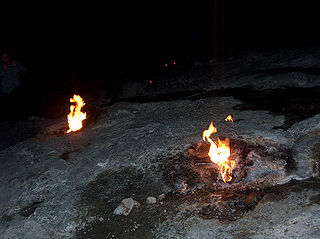Here's a proposed explanation, and some general thoughts as well, as basing a religion on a natural phenomena has it's share of difficulties since nature is always changing. Mechanisms of control within religious or occult groups go far beyond symbolic totems; it is ingrained in everything from the hierarchy to the rituals, to the teachings themselves. Truly, anything similar to your eternal divine flame in any religion would be auxiliary out of necessity to maintain control. Unless the flame literally speaks to the congregation or reveals images of God, it seems like the flame would be better off being "the gun" on the mantle in Act 1.
Figurative vs. Literal:
Even in the most traditional of religions, anything existing in "eternal perpetuity", like an ever-burning-flame is symbolic. It is generally about what the totem represents than about the actual totem itself.
Since you've established that there are more secrets behind this religious organization, it stands to reason that the congregation can't simply enter the church as they please and explore.
I think in this case, the easiest way to go about this without making the plot overly-convoluted by explaining this "divine flame" is simply that a priest or other religious figure moves the censer/torch into a back room after service, put's the flame out, and simply lights it again before the next service.
Humans have a very intuitive sense when something is figurative, especially in the context of a non-historical/currently-accessible divine totem in an organized religion.
When it needs fuel:
In cases where it has to be on display for quite some time, a fuel source could be used—hidden under a table or something similar. This would allow someone to go underneath to add more fuel, divert the flame, or do other "miraculous tricks". Some real 'Wizard of Oz' stuff.
Alternative Source:
I really like the idea @starfish-prime proposed for the naturally burning fire deposits, because this could even fool the religious elite. However the logistics are tough:
- Building a church with a natural methane/coal flame at it's centerpiece without disturbing the fragile ground that allows the flame to exist.
- These do not burn with 100% efficiency. If the area is enclosed, your religion isn't going to last very very long!
- It's impossible to tell (unless they have modern technology, in which case nobody would believe an eternally burning flame anyway) how long it could last. Sure, they could say it's been burning for 5,000 years, but it could be essentially tapped and the flame could extinguish during the next Sunday service.
Closing Thoughts & Reactions to Deception:
I would definitely give some consideration to the fact that there's really no religion in which everyone isn't aware that an "eternal flame" isn't literally eternal. I only say this because it seems like focusing on this will make the plot flat, especially if this flame is a major plot point.
Religions that catch have much deeper, unseen mysteries and traditions that go further back than what the people can see today. It seems like your divine flame is the crux of this story, and I would really recommend reconsidering.
So they find out the flame isn't eternal, then what?
Do the followers revolt? Why? Because they were lied to about something the benefactors of the religion could also claim they were just as surprised as.
The more likely scenario if the flame went out from the general population would probably be: "Oh yeah, it was figurative, but God still loves us!"
The religious elite/priests/those who are keeping the secret could easily explain a divine flame stopping by telling essentially the truth: "Fire, like a river, may look the same every day but it is constantly changing as the medium is burned. For this reason, any fire lit on this torch/at this sight is a continuation of the eternal flame."
They could also just get ahead of it by preaching sermons about the figurate nature of eternity to prepare the congregation for that contingency.

